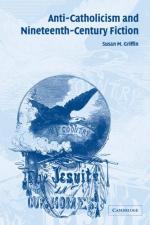|
This section contains 9,393 words (approx. 32 pages at 300 words per page) |

|
SOURCE: "Roman Catholic Fiction," in Faith in Fiction: The Emergence of Religious Literature in America, Harvard University Press, 1981, pp. 145-67.
In the essay below, Reynolds looks at Roman Catholic fiction and its character and themes, both before 1850, when it used theological and historical polemics to persuade, and after 1850, when it began to assimilate the prevailing anti-theological secularism.
Unlike Protestant novelists, who wished to find diverting, sentimental replacements for the rigorous theology of the Puritan past, Roman Catholics generally devoted their novels to attacking what they saw as Protestant divisiveness, theological evasion, and lack of logic. The free Biblical interpretation and privately formed faith that Protestant novels increasingly extolled were ultimate heresy for the Catholic writer, who tried to validate the authority of the historical True Church as a cure for contemporary Protestant corruption. While Protestant fiction was generally nontheoretical, much Catholic fiction before 1850 attempted to be intellectual and...
|
This section contains 9,393 words (approx. 32 pages at 300 words per page) |

|


